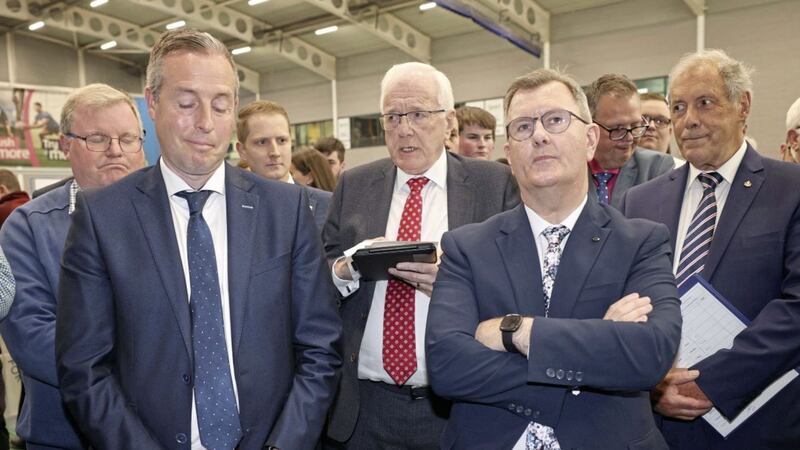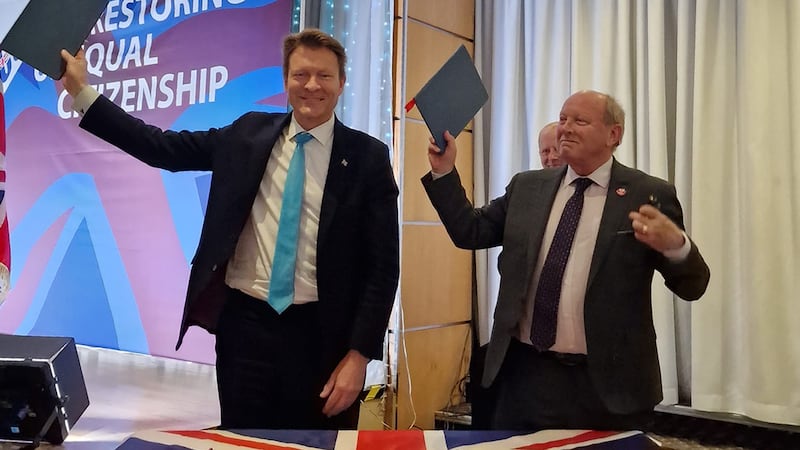With no protocol bill in the Queen’s speech, the DUP is digging in for some concrete development in London before it returns to the executive. A bill could appear as soon as next week but this would take a year to pass, followed by another year of working through the protocol appeal mechanisms should the UK decide to use its new legislation. Worse still for the DUP, the government is briefing the process will be lengthy and any action should proceed slowly. BBC Newsnight quoted Downing Street sources saying Sinn Féin’s mandate must also be respected.
The DUP’s Stormont staring contest is sustainable for several months but completely implausible on a timescale of several years. The party will have to blink first, everyone knows it and the government is effectively announcing it. The only thing the DUP has going for it is the furious over-reaction from Brussels and Dublin.
**
THE DUP’s refusal to nominate a speaker followed a statement from Jim Allister that opening the assembly would “surrender... leverage” by allowing “the facade of Stormont to function”.
It became obvious the DUP would give in to Allister when Emma Little-Pengelly was co-opted early into Sir Jeffrey Donaldson’s seat – something that required the outgoing speaker.
No assembly means no scrutiny of caretaker ministers, side-lining Allister himself, although that is of little consequence compared to the TUV setting the DUP’s agenda. More importantly it means no private member’s bills, such as the organ donation law passed earlier this year.
As the DUP and TUV combined cannot raise a petition of concern, such bills could have been a significant loophole in the devolution deadlock.
**
An air of unreality hangs over discussion on how the protocol is working so far. Emerging figures on prices, costs and trade are being debated without acknowledging the hard parts of the protocol have yet to be implemented. The sea border on food was put into an indefinite grace period by the UK last September, which the EU accepted. The EU gave up on most of the medicines sea border last month. How much better placed we would all be if the government and the DUP were happy to let this continue, with the unworkable aspects of the protocol quietly falling apart.
**
The Troubles legacy bill in the Queen’s speech was not the amnesty proposed by the secretary of state last year. The bill’s description is a rehash of the 2014 Stormont House Agreement, supported by all main parties except the UUP. It has the same basic concept of immunity for testimony and the same basic structure of institutions for information recovery, reconciliation and archives. The difference is there will be no Historical Investigations Unit, the Stormont House successor to the Historical Enquiries Team. So although prosecutions will be possible with new evidence, nobody will be looking for new evidence. How much this matters when convictions have become all but impossible is the question that remains.
**
For the past 15 months, Northern Ireland politics has been defined by how the DUP reacted to a LucidTalk poll showing TUV support jumping from 6 to 10 per cent. The DUP promptly reversed its acceptance of the protocol then ditched Arlene Foster, to no avail. The three remaining LucidTalk polls of last year had the TUV on 11, 14 and 11 per cent. The only other regular series of polls, from Liverpool University, were similar to LucidTalk apart from having the TUV on 5 to 6 per cent. So who was right? LucidTalk polls this year showed the TUV dropping to 9 per cent, much closer to the actual 7.6 per cent result than Liverpool, whose final prediction was 4 per cent. That makes it likelier LucidTalk was right all along. But as the final result is closer to where Liverpool was all along, there is still no clarity on whether the DUP’s disastrous panic over the TUV was ever necessary.
**
A debate about nomenclature kicked off at a Sinn Féin press conference after Michelle O’Neill was asked if she would “say the words Northern Ireland” to show she will be a “first minister for all”.
While this might not be an acceptable demand from a political opponent it was a valid question from a journalist. In 2016, Sinn Féin minister Carál Ní Chuilín gave the same question an ingenious riposte, telling the assembly: “Northern Ireland is a phrase I will say but not a term I will use.”
O’Neill went one better later this week when she did refer to “the Northern Ireland Executive”. That was using Northern Ireland in a term, if not as a term.
It is hard to avoid the suspicion all this has been planned out for years.
**
Former PSNI deputy chief constable Stephen Martin is to take up the equivalent post at the Civil Nuclear Constabulary, which protects the UK’s reactors and uranium.
“I very much look forward to working with all my new colleagues around Great Britain in their critical mission of safeguarding the nation’s nuclear interests,” he said.
One of the first things Martin will learn in his new role is to be more careful when using the word ‘critical’.









